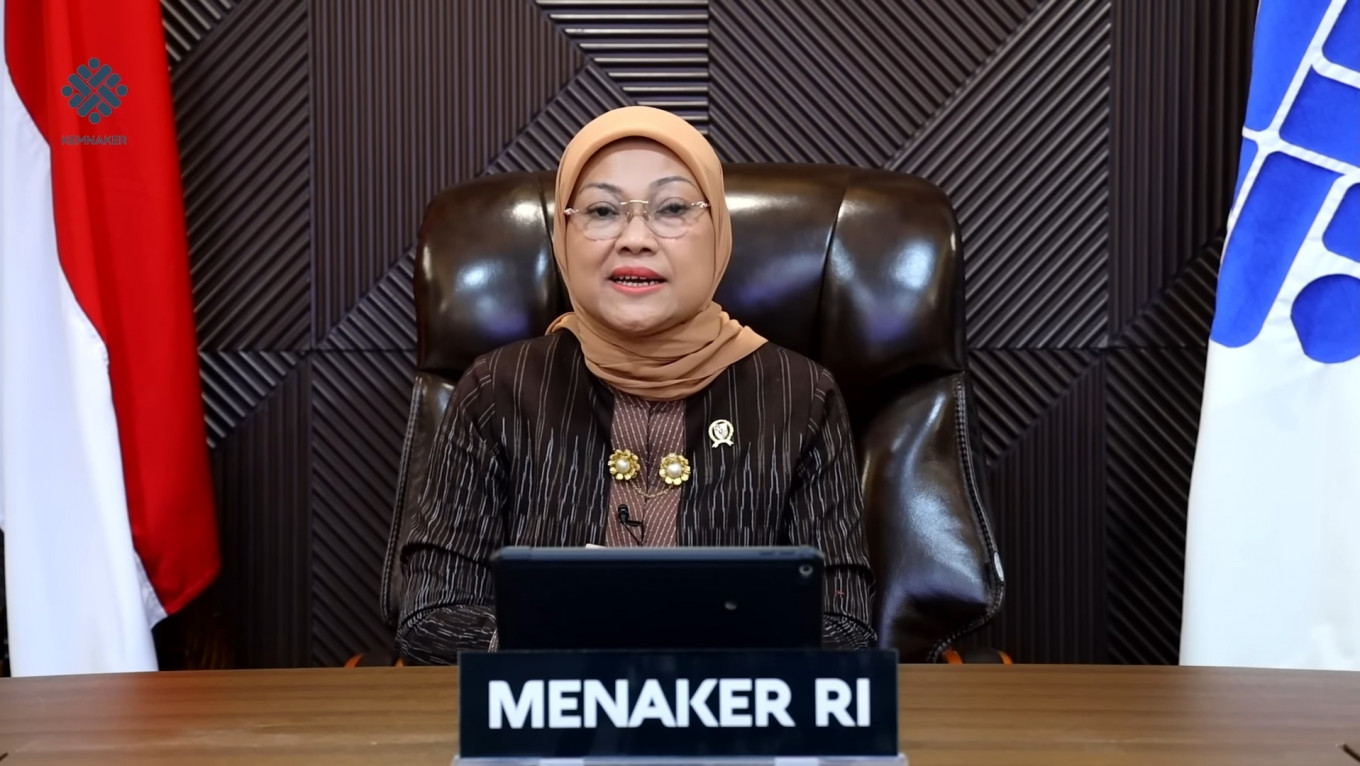Popular Reads
Top Results
Can't find what you're looking for?
View all search resultsPopular Reads
Top Results
Can't find what you're looking for?
View all search resultsNew minimum wage policy causes controversy
Employers claim steeper pay rise may burden economy.
Change text size
Gift Premium Articles
to Anyone
A
new minimum wage regulation that offers significant pay rises to workers has elicited backlash from employers, who say the salary bump is out of keeping with next year’s bleak economic outlook.
In a virtual press briefing on Saturday, Manpower Minister Ida Fauziyah announced that Ministerial Regulation No. 18/2022 would introduce a new formula for calculating minimum wages for 2023. The minister authorized the regulation in response to a stalemate between labor and business over the issue of wage increases.
In the absence of the new regulation, Government Regulation (PP) No. 36/2021, an implementing regulation of the 2020 Job Creation Law, would have served as the basis for setting such wages.
Through the new ministerial regulation, the government caps the rate at which governors can hike minimum wages for next year at a maximum of 10 percent, and it gives governors, mayors and regents a few more days to announce the minimum wages for their respective regions. Under PP 36/2021, the announcements were due last Monday.
Mayors and regents can set wages above, but not below the provincial minimum announced by governors.
Indonesian businesses, particularly those represented by the Indonesian Employers Association (Apindo), have been calling for the government to stick with the formula of PP 36/2021 for determining minimum wage hikes.
Labor unions, on the other hand, had challenged PP 36/2021 as they said it would result in a lower average minimum wage increase than PP No. 78/2015, which was the basic regulation before the issuance of PP 36/2021.
“The minimum wage formulas in PP 36/2021 do not accommodate the socioeconomic impact [of inflation], as the minimum wage has yet to catch up with the price increases for goods,” Ida said when introducing the regulation.
Under the new formula, next year’s minimum wage is the current year’s minimum wage plus an adjustment value.
The adjustment value, meanwhile, equals regional inflation plus regional economic growth, but with the latter multiplied by a variable termed “alpha” that can range between 0.1 and 0.3, hence reducing the total.
“The alpha value must consider labor productivity and the expansion of employment opportunities,” Ida continued.
Under PP 36/2021, factors for determining minimum wages are purchasing power, the labor absorption rate, median wages within the particular region, the average number of household members and household earners, while either regional inflation or regional growth—whichever is higher—also feed into the result.
“The national economic foundation is mainly formed by household spending, which is greatly influenced by purchasing power and price fluctuations,” Ida added, “therefore it is important to maintain people’s purchasing power.”
Indonesian Chamber of Commerce and Industry (Kadin) chairman Arsjad Rasjid said that, while the association “welcomed” the government’s decision to raise minimum wages, PP 36/2021 remained a point of reference for the regulation, which created “legal dualism”.
He recommended that, as not all economic sectors would fare well in the upcoming year, minimum wage hikes should rely more on “winning industries” enjoying the strongest growth in the period during which the policy would apply.
“We hope that the rise in minimum wages will be followed by incentives for industries affected by global economic turmoil, such as labor-intensive and export-oriented industries,” Arsjad said in a statement received by The Jakarta Post on Tuesday.
Riau Islands Apindo chairperson Cahya expressed surprise over the government’s decision to announce a regulation in “injury time” just ahead of the deadline for the 2023 minimum wages.
“If the governor announces a decision [based on that ministerial regulation], like it or not, we’re going to request a judicial review by the Supreme Court,” Cahya told the Post.
Labor Party chairperson Said Iqbal expressed appreciation on Sunday for the ministerial regulation, saying it would serve as a basis for a further revision of PP 36/2021.
“We demand that the minimum wage be increased by a minimum of 10 percent,” Said told reporters.
“This figure is the sum of economic growth and inflation, similar to the formula of [the ministerial regulation], so governors and mayors, please use 10 percent.”
National Wage Council labor representative Mirah Sumirat said that, although she appreciated the government’s new regulation, she questioned the alpha variable in the formula.
“The formula should have returned to PP No.78/2015, where the rate was calculated by summing up inflation and economic growth,” she said in a statement received by the Post on Monday.
University of Indonesia law professor Aloysius Uwiyono said on Monday that, although the new regulation contradicted PP 36/2021, the COVID-19 pandemic allowed the government to invoke the force majeure principle to introduce the new rules.
“If the government had used PP 36/2021 to determine the minimum wages, then the raise in 2023 would be around 6 or 7 percent. This would reduce workers’ purchasing power,” Aloysius told the Post.










